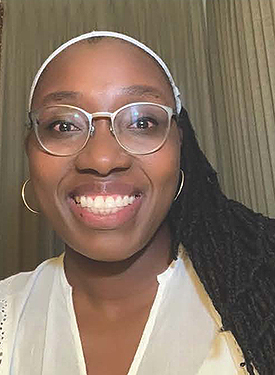 National Science Foundation Graduate Research Fellowship
National Science Foundation Graduate Research Fellowship
Jocelyne Fadiga, B.S., Chemical Sciences, 2017
Hometown: Côte d’Ivoire (the Ivory Coast) in West Africa
What does it mean to you to receive a National Science Foundation Graduate Research Fellowship?
Receiving this highly competitive fellowship gives me a boost of confidence and it is a needed reminder that I am exactly where I should be. In graduate school, imposter syndrome is exacerbated by steep learning curves, failed experiments, lack of diversity and so on. It can be a long and arduous journey, so it feels good to be recognized and "seen" along the way.
Tell me a little about your current research. Who is your advisor?
I have been fortunate to work under the supervision of Professor Orion Weiner of the Cardiovascular Research Institute (CVRI) at UCSF. In the Weiner lab, I am investigating how immune cells integrate multiplicity of cues from their environment to perform locomotion. Specifically, I'd like to understand a protein, WASP, that integrates cell polarity and migration.
How did UC Merced prepare you for graduate school?
UC Merced prepared me tremendously for graduate school in the coursework offered for my major, the research opportunities I had, and the volunteering and community engagement. I am grateful for the university size that allowed me access to all my professors. Unlike other larger universities where one can quickly feel like a registration number, at UC Merced my college experience was enjoyable and memorable.
What is your career plan after graduating with your Ph.D.?
I am open to academic positions as well as nonacademic ones because no one knows what the future holds. Either way, I am passionate about mentoring the next generation so I will incorporate that aspect into my career wherever or whatever it turns out to be.



